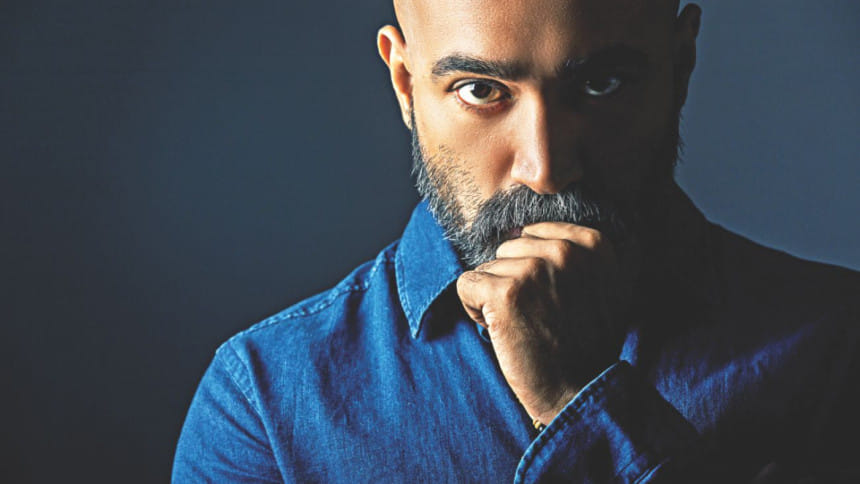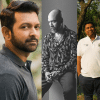Jon Kabir's Pursuit
Rafi: So, what are you busy with these days?
Jon: I am currently busy with Indalo's new album. We released a single from it called Hobeki? right before Eid. We are working on recording the entire album.
Rafi: Where do you think our music industry is headed?
Jon: In the past, the industry had an infrastructure. When an artist would record an album, a company would distribute it, and the artist would then earn royalties from it. But then there has been a huge change due to digital music distribution. We haven't got used to this change yet. I feel like we don't have a proper industry now. If you look at it, most musicians only earn money from live performances. All the albums that we make, we don't know where to release songs. The times are changing, and it will be in a better shape soon.
Rafi: Can people make a career out of music now?
Jon: Of course. Let me give a small example; in the past when an album was released you could earn money from that. Now, instead of albums people just release singles. These singles can be sold to any corporate sponsors. Now, if an artist is sellable, then they can easily make a career out of music. You have to be very good, have patience and the skills to make it big.

Rafi: So, does it mean that "views" is the most important indicator of a song's success these days? It could be that the song is not top quality, but the video is, or maybe the company that released the song has good PR. If this is the case, then this is not doing any good to the profession?
Jon: Right, I always say that whenever I create something, the first person that it makes happy has to be me. So, if I'm happy, then even if people hate it, it still satisfies me. And, people that judge songs for songs know which songs are actually good.
Rafi: So, those who take it as a profession have a hard time making a living off it?
Jon: Yes, of course. The thing is, PR is very important. Record Labels now just create videos. Artists now can buy a microphone and release it on YouTube, themselves. They might get recognized from that. There is a chance they might not make it, but there is a risk in every profession.
Rafi: Do you consider yourself a part of the band music genre?
Jon: I consider myself a music lover first. I am very fortunate to be a music lover, and be able to make music. But, I don't want to put a label on myself. I'm just a musician, and I like it this way.
Rafi: Once, band music was quite popular. And, you guys were the last band from your generation. Band culture is gone now. Do you agree?
Jon: No, I disagree. Band culture is not gone. I think that good music will always have its charm. Our country has a lot of good bands now. Now, the definition of fame has changed. When Black was still around, we could not count our fame. Now, you can easily see how many likes and views you have. In the past, the fans would have a hard time to come and talk to us. Now, it is normal for people to take selfies with us.
Rafi: Why do bands spilt up here more than abroad?
Jon: In other countries, the companies that manage bands make sure that the band members always get along. The bands we see together for a long time may have a lot of problems on the inside. They may hate each other offstage, but cannot split due to some contractual bindings. I think that is horrific. I always wondered, if music did not bring me money, if we didn't tour, would I still do music? The answer to me was very clear. But, when I saw that my band mates in Black had different answers, then I decided to call it quits. We broke up at the peak of our career. My suggestion to the band was to take a break, as we were growing old. But they didn't want that. I see many great bands still doing shows now. I never wanted that. I always thought that if I still had a career twenty years later, I would prefer singing new songs just for myself instead of songs I made a long time ago.
Rafi: Do you enjoy trying new things?
Jon: I always try to do new things. Anything new keeps me alive. It makes me feel like I can still do lots of things.

Rafi: Did you start acting just because you got an offer? Or was it because you had an interest in it?
Jon: Nope, I didn't have any passion for it. Mimi Apu gave me the offer. We went there to tell her no. But, Mimi Apu was very persistent, and we ended up going home with the scripts in our hands. Then we did the project, Off-Beat. The experience was amazing, but it was also very irritating. Initially the fact that I had to spend one or two hours for just one scene was shocking.
Rafi: Even though you don't have a passion you still continue acting?
Jon: It was when acting that I realized that I had become the character. I had to speak a different dialect for that character. That's when I realized that it was fun. Mimi Apu convinced me to take roles, and that helped my acting career. Suborna Mustafa and Humayun Faridi also helped launch my acting career. They always told me that I was a good actor, and that I should pursue acting. So, in 2014 I decided that I could do around two or three dramas at the end of the year.
Rafi: When I look at your career, it seems like you came to the scene, won the scene, and now you are there, but you aren't there. Is this true? And if it is, why?
Jon: It is very true. You cracked it perfectly. In my opinion, when you face something every day, you will get tired. I don't want to face that. I can't do music on a huge scale. If I try to do that, I will fail badly. Black catered to a mass audience, but the mass we had in the past cannot be compared to that of now. Now, I must plan out that I need to go live from my page three or four times a week. Everything is like a race now.
Rafi: You are still immensely popular, even though you are not completely in the scene. How?
Jon: The credit goes to all my fans. They still like me even though I try to stay away from them. (Laughs) Many people also like the fact that I don't do many dramas. It gives them a kind of breathing space. I am a musician, and I do music for my living. But, that doesn't mean I have to do 8 shows per month.
Rafi: How do you tackle relationships?
Jon: I feel like relationships are something that changes with time. The dynamics change. I feel like if one can control these dynamics, relationships are bound to last.
Rafi: Then why do they fail?
Jon: I don't know why peoples' relationships fail, but I know why mine do. (Laughs) I fail mostly because of priorities. My main priority is music. It's not because I earn money from it, it is because it's my first and foremost love. If I stop making music, I will never stop listening to music. I have not found someone I can love as much as I love music.

Rafi: So you were not sure about all of the relationships you had?
Jon: It was love, we wanted to be together. Without music, I feel like I cannot breathe. I want to feel the same with a certain someone. I didn't have anyone like that. Maybe I am wrong; maybe it's not possible to love someone like that.
Rafi: Jon, how do you enjoy all the stardom?
Jon: I really enjoy it. The celebrities have their own cars, follow a certain lifestyle. But, my car is always with my parents. I only use it when they don't need it. That is why I'm mostly seen on rickshaw. Whenever I am on rickshaw, and people come and ask to take photos, I feel blessed. I am very happy to take photos with fans as they put me in that place.
Rafi: You strike to me like a person who is still searching for something. What are you looking for?
Jon: Yes, I really am searching for something. Maybe I am searching for happiness. Happiness varies from person to person. But, I am always searching for something, but I don't know what that is.
Rafi: Thank you Jon, we were glad to have you with us.
Jon: Thank you Rafi Bhai, it was great talking to you.










Comments